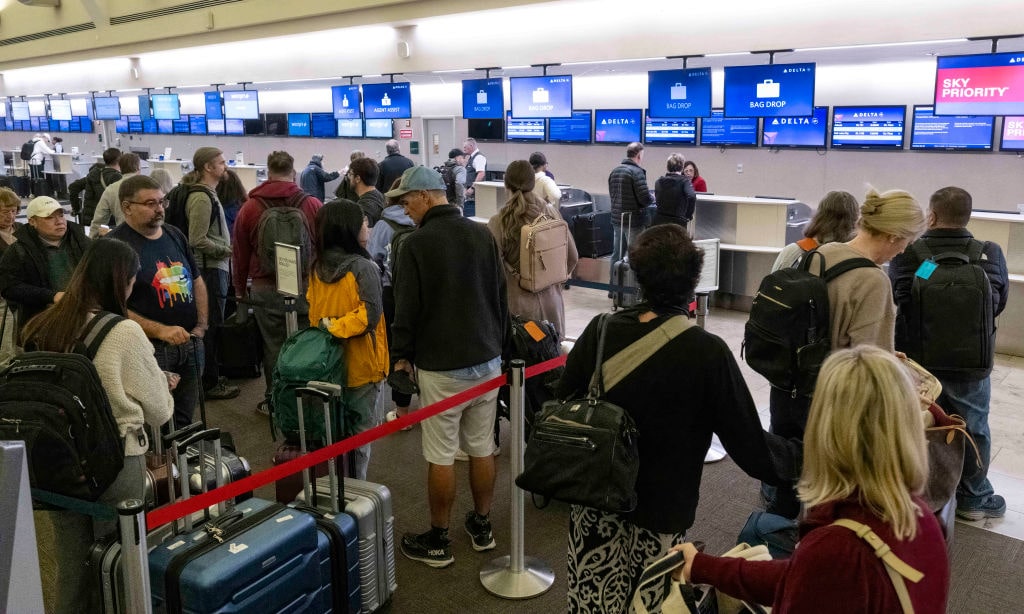Quiet Skies or Quiet Lies? Rep. Comer Wants Answers - Liberty Nation News

Uncovering clues that Biden politicized air travel.
House Oversight Committee Chair James Comer (R-KY) is on a mission to find out whether Joe Biden’s administration politicized the Transportation Security Administration’s Quiet Skies project. A secret until 2018, the program was supposed to monitor potential security risks in airports but lacked oversight and used commonplace actions as behavioral indicators to identify those who needed to be surveilled. When Homeland Security Secretary Kristi Noem shut it down a few weeks ago, Comer requested documents that Biden officials had declined to hand over during the previous administration, a refusal that Comer apparently interpreted as guilt. He might be right, but the issues with this program may have run deeper than politicization.
Quiet Skies – Surveilling US CitizensQuiet Skies was initiated in 2010 using a set of “risk-based” rules to identify passengers for “enhanced screening on subsequent domestic and outbound flights for a limited period of time or number of flights,” as the Government Accountability Office said in its 2019 report to congressional committees regarding aviation security. The program ran under the radar until The Boston Globe released an exclusive report in 2018 following its investigation of the operation, stating, “Federal air marshals have begun following ordinary US citizens not suspected of a crime or on any terrorist watch list and collecting extensive information about their movements and behavior under a new domestic surveillance program that is drawing criticism from within the agency.”
Some air marshals told The Globe that “the program has them tasked with shadowing travelers who appear to pose no real threat — a businesswoman who happened to have traveled through a Mideast hot spot, in one case; a Southwest Airlines flight attendant, in another; a fellow federal law enforcement officer, in a third.” The list of reasons to monitor passengers is long and could permit marshals to monitor just about anybody. If you have “a cold penetrating stare,” sleep on a flight, have “a ‘jump’ in your Adams apple,” stop and quickly turn around, “attempt to change appearance by changing,” “observe the boarding gate,” or board a plane last, a marshal could have grounds to follow you and add you to the watch list. Excessive fidgeting, a flushed face, sweaty palms, strong body odor, exaggerated emotions, face touching, and wringing your hands also are considered suspicious enough to warrant a marshal’s surveillance.“When someone on the Quiet Skies list is selected for surveillance,” said The Globe, “a team of air marshals is placed on the person’s next flight. The team receives a file containing a photo and basic information — such as date and place of birth — about the target.”
Because the rationale for monitoring passengers is so broad, it’s not surprising that Tulsi Gabbard, now the director of national intelligence, wound up on the Quiet Skies list in 2024. She claimed it was retaliation for critical comments she had made about Vice President Kamala Harris. Maybe it was, or perhaps the secretary fell asleep on the flight and moved her Adam’s apple the wrong way. Then again, a simple background check would have alerted air marshals to her identity, which makes the whole situation very curious.
“According to two senior U.S. officials briefed on the matter,” explained The New York Times last year, “the additional security measures were triggered by an event she [Gabbard] attended at the Vatican that was organized by a European businessman who appeared on an F.B.I. watch list.” Is that the real reason? We may never know. She and her husband faced “extensive screenings, with boarding passes marked ‘SSSS’ for Secondary Security Screening Selection, which lasted up to 45 minutes per flight,” explained Just the News. So she was on the list for a while and underwent additional screening measures each flight. Why?
Favoritism?William Shaheen, husband of Sen. Jeanne Shaheen (D-NH), landed on the list in 2023. He “traveled multiple times with a known or suspected terrorist, but was removed from the Quiet Skies list after Ms. Shaheen directly lobbied the T.S.A. on her husband’s behalf,” explained The Times. Mr. Shaheen was later added to the Secure Flight Exclusion List, preventing him from being designated for Quiet Skies selection. Does that seem to reek of favoritism?
Comer wrote Noem that the “case involving Senator Jeanne Shaheen’s husband — who received unprecedented exemptions following direct political intervention despite multiple travels with suspected terrorists— exemplifies these problematic practices.”
According to a DHS press release announcing the end of Quiet Skies on June 5, “Shaheen was not the only high-profile individual that was placed on this exclusion list: this list also included members of foreign royal families, political elites, professional athletes, and favored journalists.” The names of the exempted are not mentioned. But DHS claims that “documents, correspondence, and timelines that clearly highlight the inconsistent application of Quiet Skies and watchlisting programs” have been uncovered. “It is clear,” said Noem, “that the Quiet Skies program was used as a political rolodex of the Biden Administration—weaponized against its political foes and exploited to benefit their well-heeled friends.”
Even if an investigation does reveal the Biden White House weaponized the program, the real win for Americans has likely already happened – the termination of Quiet Skies. After nearly 15 years, it “failed to stop a SINGLE terrorist attack while costing US taxpayers roughly $200 million a year,” said Noem. “The Trump Administration will return TSA to its true mission of being laser-focused on the safety and security of the traveling public. This includes restoring the integrity, privacy, and equal application of the law for all Americans.”
~Liberty Nation does not endorse candidates, campaigns, or legislation, and this presentation is no endorsement.